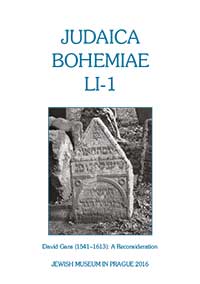THE KARAITE RECEPTION OF DAVID GANS’ WORK
THE KARAITE RECEPTION OF DAVID GANS’ WORK
INTRODUCTION
Author(s): Daniel J. LaskerSubject(s): History, Jewish studies, History of Judaism
Published by: Židovské Muzeum v Praze
Keywords: David Gans;, the Karaites of Eastern Europe;Karaism; Rabbinic Judaism
Summary/Abstract: David Gans (1541–1613), a Renaissance Jewish polymath, is known for his historiographical work Tzemah David and his scientific book Nehmad ve-naim, both of which exercised great influence on subsequent Jewish authors. In the following, I will discuss how one subset of Jews, the Karaites of Eastern Europe, utilized these works for their own purposes. It is often thought that because the Karaites eschewed rabbinic legal interpretations as found in the Oral Law, they rejected rabbinic literature in toto. Although it is true that Karaites developed their own legal system based on a non-rabbinic reading of the Bible, they were not literalists and they did not reject everything rabbinic out of hand just for being rabbinic. Although Karaite origins are unclear, beginning in the ninth century, from its earliest stages as an identifiably separate religious movement, Karaism reacted to Rabbinic Judaism as part of its own self-definition. Classical Karaism, centered in the Land of Israel and often identified by its mourning for Zion, made every effort to distinguish itself from Rabbinic Judaism, but it was still influenced by the majority interpretation of Judaism. By the twelfth century, Karaism was mostly a diaspora phenomenon and the ascetic practices of the mourners had been long abandoned. Karaites resigned themselves to the status of a small minority group alongside a larger Rabbanite (i.e., non-Karaite) majority, and rapprochement between the two groups led to an even greater Karaite reliance on rabbinic Jewish literature. Indeed, one Karaite authority, Nissi ben Noah, declared that Karaites should learn Rabbinic sources, “since most of the Mishnah and Talmud are the words of our (i.e., Karaite) ancestors.” Karaites turned to Rabbanite authorities in many fields, including exegesis (such as Abraham Ibn Ezra), philosophy (such as Maimonides), and even sometimes law (again one may mention Maimonides). By the end of the fifteenth century, Byzantine, and then Ottoman, Karaites had made ritual reforms and adopted a moderate Maimonidean philosophy. They were not Rabbanite Jews, but the antagonism and competition, at least from the Karaite side, had much abated. Early modern Eastern European Karaites, centered in parts of Crimea, Lithuania, Galicia, and Volhynia, continued in the same manner and became more and more dependent upon Rabbanite sources.
Journal: Judaica Bohemiae
- Issue Year: LI/2016
- Issue No: 1
- Page Range: 149-159
- Page Count: 11
- Language: English
- Content File-PDF

